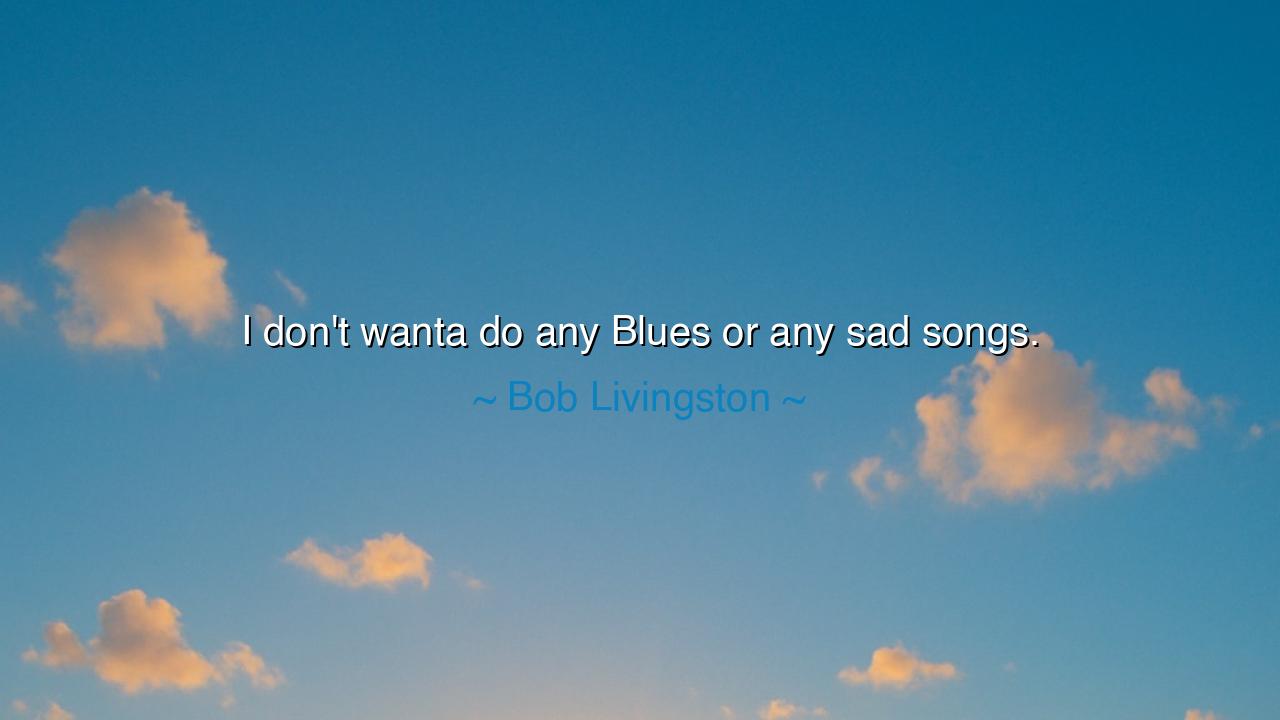
I don't wanta do any Blues or any sad songs.






Hear, O children of the song, the declaration of Bob Livingston, who once said: “I don’t wanta do any Blues or any sad songs.” At first hearing, these words may sound as though he sought to turn away from depth, to avoid sorrow, to choose only the lighter road of melody. But look more closely, and you will find wisdom here: for Livingston is not rejecting truth, but seeking a different truth—the truth of joy, of uplift, of the power of music to heal not by lament, but by celebration.
Mark well the meaning of Blues. For the Blues are born from suffering, from the chains of hardship and the cry of the soul longing for release. They are noble, ancient songs that carry the weight of oppression and sorrow, and in their sadness lies their beauty. Yet, Livingston declares his intent to step away from this path—not because it lacks worth, but because his spirit in that moment yearned for light. His words remind us that music is a river with many streams, and each artist must choose which current to follow.
The refusal of sad songs is itself a statement of hope. For there are seasons in life when the heart has heard enough lament, when the soul is tired of carrying shadows, when it longs instead for the fire of joy, for laughter and rhythm that lift rather than weigh down. Livingston’s stance, then, can be seen as a turning of the face toward the sun. It is not denial of pain, but a conscious choice to emphasize life’s brighter tones.
Consider the story of Beethoven, who wrote not only mournful adagios but also triumphant symphonies. Though his life was marked by deafness and despair, he composed the “Ode to Joy,” a piece that defied his suffering by exalting universal brotherhood and hope. In like manner, Livingston’s rejection of sad songs does not dismiss sadness as meaningless, but insists that music can be a vessel of strength, a reminder that joy itself is a weapon against despair.
And yet, his words also teach us about freedom. The artist is not bound to tradition or to expectation. If the world demands the Blues, he may choose another path; if the audience hungers for sadness, he may offer instead celebration. This freedom to choose what to sing—and what not to sing—is the essence of authenticity. True artistry lies not in pleasing every ear, but in remaining faithful to the voice within.
The meaning of Livingston’s words is thus twofold: first, they reveal a yearning for light over darkness, for joy over sorrow; second, they remind us that each of us has the right to choose the tone of our own song. Life will always present us with sorrows, but it also offers us the power to decide whether to dwell in them or to rise above them.
So take this lesson to heart: in your own life, know when to honor grief, but also know when to set it down. Do not be ashamed to turn away from sadness and seek joy, even if others expect you to carry the Blues forever. Take practical steps: choose music, stories, and companions that lift your spirit; create moments of laughter even amidst trial; and remember that joy is not frivolous—it is strength. For as Livingston teaches, sometimes the noblest path is not to sing sorrow, but to lift your voice in celebration, and in doing so, to remind the world that light still shines.






AAdministratorAdministrator
Welcome, honored guests. Please leave a comment, we will respond soon